Let’s talk — adoptive mom to adoptive mom.
I understand having fears about adoption and, by extension, fears about making changes in adoption law. Change can be scary. For decades many states have had laws on the books to protect people from the humiliation of unwed pregnancy or the shame of infertility or the stigma of being born to unmarried parents. In response, we have put up walls to hide the shame and stigma and humiliation.
One of those walls is the practice of closing birth records for one group of people who, due to circumstances of birth, to this day do not enjoy a civil right that all other citizens in your state do. It is time to re-evaluate the existence of this walls, as so many of your Texas bipartisan colleagues in the Senate and House were eager to do at the close of the legislative session last month.
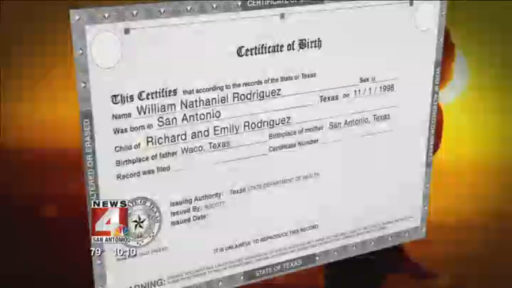 While I do understand having fears, Dr Campbell, I also think we should periodically re-examine and let go of fears that don’t withstand ongoing scrutiny. Let’s take a look at one of the fears that motivated your stance on Texas House Bill 984. Your office said that you’re “concerned with the broad language of the bill, and felt it violated the privacy of those involved in the adoption.”
While I do understand having fears, Dr Campbell, I also think we should periodically re-examine and let go of fears that don’t withstand ongoing scrutiny. Let’s take a look at one of the fears that motivated your stance on Texas House Bill 984. Your office said that you’re “concerned with the broad language of the bill, and felt it violated the privacy of those involved in the adoption.”
[Click for news story of the bill’s defeat.]
Why Secrecy Exists
When you say privacy I wonder if you are confusing it with secrecy, which takes simple privacy and wraps it in toxic fear and shame. Privacy is chosen, secrecy is often imposed.
Secrecy exists because shame exists. With openness, by unsealing records and providing equal access for all, we can dissolve the shame and vanquish the need for secrecy. Regarding the privacy issue, accurate birth records should be kept private from the public but not secret from the parties directly involved.
As you may already realize, the Internet and advances in DNA testing have enabled birth mothers and birth fathers and their now-adult children to find each others’ identities by skirting laws that were constructed in that era of shame and secrecy. Psychotherapist Karen Caffrey, who is an adult adoptee with birth family from Texas, says, “Family genetic secrets are very soon going to be a thing of the past.”
So why not change the laws to keep up with the times?
By the sheer numbers of people — adopted or not — who are searching for their biological kin, we can conclude that there is an innate human need to know one’s origins, no matter the story behind it. How else to explain the popularity of Roots, of Who Do You Think You Are, or of Ancestry.com, which facilitates folks in enjoying the second-most popular hobby in the country?
I wonder, Senator Campbell, if one of your fears comes from an Either/Or mindset that stems from the way we’ve done adoption during our lifetimes, in which for you to fully claim your daughter, you must negate on some level the existence of her other set of parents. But we don’t have to split our children in this way. We can instead embrace a Both/And heartset in which all are acknowledged and valued, no matter if there is contact or not, no matter if you know the identity of your daughter’s birth father or not.
Hard Pressed
I hear during your questioning at the hearing of a similar bill in 2013 that you may be fearful that the child might want to “go back for financial reasons.” Quite frankly, I do not understand this. You pressed witnesses quite hard to name a valid impetus for the bill. Might I press you to say what makes you think an adult adoptee would have money as a prime motivator for searching for her biological roots? In all my years of learning about the many facets of adoption, I have not heard one story or seen any statistics on this being the case.
When STAR (Support Texas Adoptee Rights) and its legislative allies manage to bring this issue to the table again during the 2017 legislative session, please consider the 180-degree turnaround that happened 21 years ago to a citizen activist in Ohio.
An Adoptive Dad Sees the Light
Adoptive father Brad Norris had worked with the legislature to seal Ohio’s birth records in the 1960s. He later said:
“I did not want any and all members of the general public to have access to my children’s birth records . . . We must be honest in recognizing that the 1964 law was created mostly out of concerns felt by adoptive parents.” [source]
Three decades later in the 1990s, Brad Norris testified in support of a bill to equalize access to birth records for adult adoptees. In his testimony, Mr Norris, adoptive dad to Betsie Norris, Executive Director of Adoption Network Cleveland, explained his change of heart and his chagrin at the wall he’d helped erect.
“In doing what I did on this 1960s legislation, I was unable to see the impact this would have on my adopted children when they became adults . . . I now recognize that closing those birth records to adoptees … was a grave mistake . . . there was not sufficient attention given to what happens when the adoptive child grows up and needs to know his or her genetic medical history or when the adult adoptee develops an undeniable yearning to know what his or her roots are.” [source]
For your own sake, Dr Campbell, please open your mind and your heart to this issue that you have previously been closed tight on. You don’t want to be seen as the last one propping up an oppressive wall, do you?
Sincerely,
Lori, mom via adoption
Three things cannot be hidden:
the sun, the moon, and the truth. ~~ Buddha
~~~~~
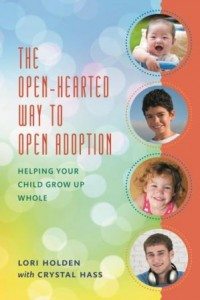 Lori Holden, mom of a teen son and a teen daughter, blogs from Denver. Her book, The Open-Hearted Way to Open Adoption: Helping Your Child Grow Up Whole, is available through your favorite online bookseller and makes a thoughtful anytime gift for the adoptive families in your life.
Lori Holden, mom of a teen son and a teen daughter, blogs from Denver. Her book, The Open-Hearted Way to Open Adoption: Helping Your Child Grow Up Whole, is available through your favorite online bookseller and makes a thoughtful anytime gift for the adoptive families in your life.

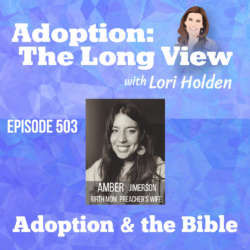
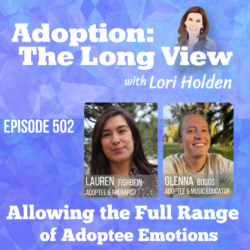
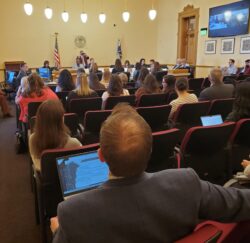
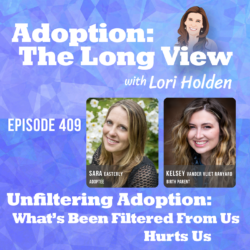

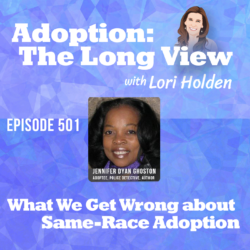
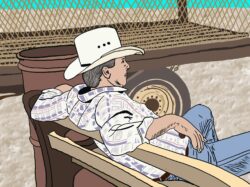
13 Responses
Thank you for writing this. I have felt so frustrated by this issue- and Senator Campbell is my elected representative. Your letter is beautifully and thoughtfully written- I hope it opens her heart and her mind to the bigger issues at stake.
Thanks, Teri. I hope the 2017 session brings a better result for adoptees and those who love them.
I am an abandoned adoptee from California. I know, first hand, how we adoptees are the only parties with no rights in adoption legislation. We are the ones most affected by adoption, and we are the only party with no rights. Doesn’t make sense, does it? Your letter is beautiful and I thank you for expressing how I feel. Learning my roots does not negate the love and respect I have for my adoptive family. It can only enhance it.
This is such a salient point, and I wish I’d included it in my letter: “Learning my roots does not negate the love and respect I have for my adoptive family. It can only enhance it.”
The thing adoptive parents want most — a loving, trusting, enduring, vibrant ongoing relationship with our child even after they become an adult — is, as you point out, MORE likely to happen when we are open and not closed to their wonderings about their biological roots.
So well done Lori – I hope she somehow reads it and listens to you. Perhaps you could mail her a copy of your book with the letter?
Thanks for all you do…
Thank you so much for very eloquently communicating what so many of us adoptees wish to convey to this woman. I appreciate you giving our view a voice. Interesting note – I was fortunate enough to find my biological parents after graduating from college, despite my sealed records. I became very close with my natural family. When my biological father died, he left me $1,000,000. I felt very bad for his wife and my biological half-sister, because he did not leave them in a good position financially. I gave them the money he left me, and continued on with my career. It is frustrating to now be labeled a “gold digger” by this women. I am also frustrated to know that she would give this as her reason for keeping our records sealed, but very fortunate that I got to know my relatives, especially my dad before he died. He became my best friend for many years. While my dad was under no obligation to leave me inheritance, I will always appreciate that he honored me as he did. However, I also loved his wife and my biological half-sister enough to understand the difficult situation he left them in, and was fortunate that I could stand on my own financially…….the gold digger that I am! My half-sister kept the money, but has made it her life’s work to help adopted kids like me. In the end, our biological parents should be able to honor us with inheritance if they chose to. This women should not get to stand in the way. It is frustrating that she does not stand for limited government in this case!
Yes, I tend toward libertarian values, and it is curious that Big Government is invoked in cases of private and personal records.
Interesting scenario about your biological father. AND the love you have for those in his family. This exemplifies the Both/And approach.
Bravo! Here’s hoping the Senator reads this and decides to do some self reflection. No relationship is successful on “either/or” thinking. Only with “both/and” can the healing begin.
I agree with TAO: Send the Senator a copy of this letter, with your book would be great, but without would be OK too.
It is good to know there are wise people like you who are able to speak out. I hope the Senator sees your letter.
Standing up and applauding. Thank you for writing this. I hope these words reach the Senator’s eyes. And heart. I hope they reach her heart.
Thank you very much for writing this piece. People need to know what has happened in TX and also become more educated. Open records provides a healthy pathway for those adopted to complete the picture. It should not been seen as a threat, but as empowering to adoptees and everyone who loves them and wants them to feel whole.
Unfortunately, Senator Campbell has not heeded your advice. She’s back and just as oppositional as ever. This time with a “Mother’s Privacy Protection Act” that does approximately nothing- besides making me gag.